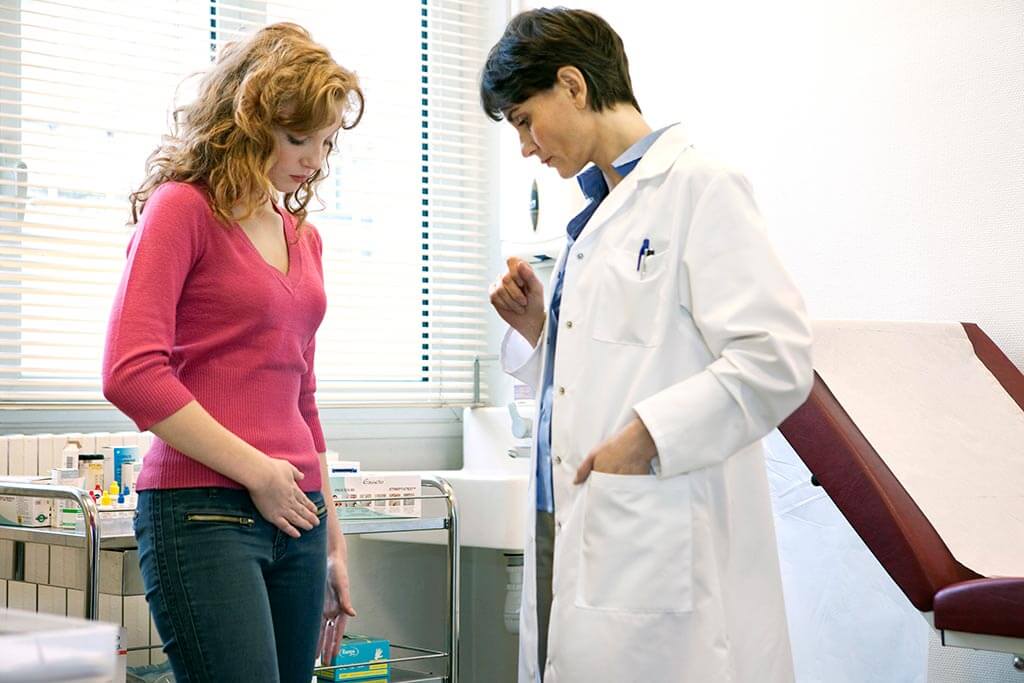Nowadays cervical cancer stays in the focus of attention, as it affects women more than most other forms of oncological disorders. Mass media, healthcare professionals and specialized medical societies provide comprehensive information on cervical cancer symptoms, which is essential for the early disease detection. Actually, cervical cancer is one of the most preventable cancer types in case of timely diagnosis. It rarely arises in women under 20 years old, but women between the ages of 35 and 44 are at the highest risk. The risk also depends on the ethnicity – Asian females develop this condition more rarely comparing to White and Black ones.
Regular prophylactic examination and screening tests are the most effective measures in cervical cancer revealing. Nevertheless, careful and attentive attitude to own health is extremely important, as well. Being alerted about typical symptoms of cervical cancer is essential for every woman.
Content
- Does cervical cancer always cause symptoms?
- First symptoms of cervical cancer
- Symptoms of advanced cervical cancer
- Do I necessarily have cervical cancer in such symptoms presence?
- Where can I seek for specialized medical help if I need more options for cervical cancer?
Does cervical cancer always cause symptoms?
Cervix of the uterus is the very important and special part of this organ. Cervix connects uterus with vagina, providing movement of man`s sperm to woman`s egg cell. The same time cervix needs to protect uterus from the content of vagina – natural bacteria (e.g. lactobacilli), mucus, and possible pathological microorganisms. To perform all these functions in a proper way cervix of the uterus requires special anatomical structure. So, the inner part of the cervix (endocervix or cervical canal) is covered with so-called columnar cells and the external part (ectocervix, visible during the colposcopy part) is covered with thin squamous cells. Naturally, both types of these cells meet and form a specific border – transformation zone or T-zone. T-zone is the most possible location of primary cervical cancer, as it contains cells of two types and certain amount of intermediate type cells.
At the early beginning of oncological process some cells in T-zone lose their normal features and become atypical. Usually this happens in external, squamous cell zone (up to 90% of all cases). At first abnormal cells are revealed only on the surface of the cervix. Such changes are commonly regarded as the pre-cancerous ones, as there are no signs of tumor growing or invasion of the surrounding tissues. At this stage a woman has no obvious symptoms of the process, but pathological cells can be found during the screening examination. In addition, certain sings of cervical cancer risk factors may be detected – for example, papillomas in HPV (human papillomavirus) infection, which is the most widespread cervical cancer cause.
With the course of time abnormal cells continue multiplying, form a tumor mass and damage deeper tissues of the cervix. When the process affects mucus-producing cervical glands and blood vessels certain new symptoms arise, including bleeding and pathological discharge. In addition, tumor may directly or indirectly influence nerves, causing atypical pain syndrome. At this stage careful attitude to own health helps in suspecting the disease and confirming the diagnosis.
Advanced cervical cancer affects not only woman`s reproductive system, but surrounding organs and tissues, as well. At this stage cervical cancer always causes multiple symptoms. Usually this involves problems with urination, changes in bowel habits, pain in different locations, and general symptoms, like weight loss and tiredness. Women with advanced cervical cancer (i.e. beyond the stage one-three) often start from attending specialists in urology, gastroenterology, etc. before revealing the true cause of complaints.
First symptoms of cervical cancer
It should be noted that there are no symptoms that are specific only for cervical cancer. All mentioned below complaints can be caused by conditions other than cervical cancer, as well. Nevertheless, it is better to visit you doctor once any new symptom has developed. This will be helpful in improving your state of health anyway.
The most typical and widespread sign of cervical cancer is abnormal vaginal bleeding. “Abnormal” means that the bleeding occurs at any time other than your usual monthly period. It can be intensive or just leave few drops of blood on your sanitary pad. Bleeding often starts after mechanical contact with the cervix, e.g. after sexual intercourse, douching or the pelvic exam by your gynecologist. It is connected with damage of fragile superficial blood vessels of the cervix. Abnormal cell growth invades the tiniest capillaries, breaks their walls and alleviates blood outflow. Additional attention should be paid to bleeding after the menopause. In such case oncological alertness is very high, as it is strongly linked to cervical cancer or other types of cancer occurring in female reproductive system.
Cervical cancer can also cause changes in your menstrual periods type. The oncological process will not stop your period completely, but it can become longer and heavier due to changes in the cervix structure and hormone levels. Duration of period may increase up to 5-10 days, with almost equal intensity of bleeding. Fragile and damaged blood vessels along with poor blood coagulation make blood loss more significant and can even cause anemia. In addition, some women mix intermenstrual bleedings from the tumor tissue with normal menstruation and don`t pay attention to this important sign.
Abnormal vaginal discharge or odor can also be a sign of cervical cancer. Physiological vaginal discharge is normally present in healthy women. It consists of mucus and fluid produced by glands in the vagina and cervix and helps in cleaning vagina from dead epithelial cells and bacteria. In women with cervical cancer discharge may become watery, thick, contain blood or have a foul odor. It is connected with excessive production of mucus by pathologically changed cervical cells, presence of atypical cells remnants and hemorrhages from superficial blood vessels. Unpleasant smell of the discharge is explained by concomitant noninfectious inflammation process.
Discomfort or pain during the sexual intercourse is called “dyspareunia”. Presence of this symptom usually makes a women visit doctor as soon as possible. Unfortunately, development of pain usually means that cervical cancer continues advancing. Cervix of the uterus itself doesn`t contain any superficial sensitive nerves and can`t be the direct cause of pain syndrome. Developing pain during or after the sexual intercourse, especially the one irradiating (spreading) to other parts of the body, means that cervical cancer has already affected surrounding tissues and nearby organs. Mechanical impact on the cervix during the sexual intercourse spreads further and stimulates damaged tissues causing discomfort or pain.
Another sign of more advanced cervical cancer is pelvic pain (which is pain in the area between your hip bones) or pain in lower back without strong connection to the day of a menstrual cycle. In this situation pain syndrome varies from mild to severe one, but it is always caused by involvement of pelvic nerve plexus in the pathologic process. No doubt, in revealing such kind of pain syndrome we mainly think about neurological pathology, this doesn`t necessarily mean that you have cervical cancer. Nevertheless, this complaint completes the whole clinical picture in combination with other symptoms.
Symptoms of advanced cervical cancer
Under “advancing” of any type of cancer we usually mean its direct spreading to the nearby tissues and organs or metastasizing to remote locations through blood stream or lymphatic system. This statement is true for cervical cancer as well. Cervical cancer affects not only the reproductive system of a woman; it can easily spread to other pelvic organs. Sometimes symptoms of the reproductive system pathology have minor importance when comparing to disturbances of urinary or digestive tract.
Urinary system affection is the most widespread manifestation of advanced cervical cancer. This is explained by anatomical proximity of uterus, bladder and urethra.
Typical complaints include the following:
- Difficulty of urination. It may become hard to pass the full volume of urine out; you may feel like some amount of it has been left inside.
- Frequent urination, urinary incontinence. You may need to visit lady’s room more often or use special pads, as it becomes difficult to control the process of urination.
- Pain during the urination is usually connected with disturbing damaged parts of the urinary tract. This usually happens when a tumor affects ureters or urethra.
- Presence of blood in urine (hematuria) is a significant sign always related to oncological alertness. When a tumor damages large blood vessels visible blood is detected in the urine. Sometimes urine contains blood from the vagina, as well, but a doctor can distinguish sources of bleeding.
- Hydronephrosis is enlargement of one or both kidneys due to the obstruction of urine flow caused by a tumor. Hydronephrosis causes permanent and quite intensive pain in the back, which is not relieved by usual painkilling drugs.
The symptoms of gastrointestinal system affection include changing your bowel habits (constipation or diarrhea), painful defecation, and bleeding from the rectum during the defecation. Such changes are caused by blockage of intestines by a tumor or by blood vessels damage. Usual drugs for the gastrointestinal symptoms relieving are not that effective in this case, as a tumor has direct mechanical influence on the bowels.
Dissemination of the oncological process in the lymphatic system often causes asymmetrical swelling of one of your legs. This happens when a tumor hampers natural movement of lymph through lymphatic vessels. Excessive amount of lymph is gathered in lower abdomen and legs causing swelling. Usually this is one-sided process, so the flow of lymph is not blocked completely. Peculiarity of legs swelling in women with cervical cancer is absence of response to diuretic drugs.
Bone pain and bone fractures in women with cervical cancer usually indicate presence of pathological loci in bones (remote metastases). The most typical mechanism of bones involvement is spreading of the tumor from affected paraaortic lymphatic nodes to vertebral body. Due to decent level of diagnostics the disease is usually revealed at the stage 1-3, so this tertiary complication is a rather rare one.
Symptoms of general intoxication: tiredness and lack of energy, fatigue, weight loss, loss of appetite. This bunch of complaints is inevitable in women with large tumors. Tumor influences the whole body in two ways: by consuming essential nutrients and by releasing toxic products of destruction. Such symptoms are not specific for any disease, so they usually force your general practitioner to start basic examination in order to reveal the cause. Beyond all doubt, you should not think about cancer once you notice any of this signs, but this is a decent reason for visiting hospital.
Do I necessarily have cervical cancer in such symptoms presence?
If you have any suspicion regarding cervical cancer development or you are concerned about changes you experience you should visit your gynecologist and have a complete gynecological examination. The only way of confirming or rejecting the diagnosis is getting Pap smear test. This investigation will detect cancerous cells in case any are present. Nevertheless, a number of cervical cancer signs can appear in other, less serious health conditions. Qualified gynecologist is competent in recognition of concomitant disorders, so a doctor will refer you to the specialist in other medical sphere. The most typical causes of similar to cervical cancer symptoms are listed below.
Rather widespread cause of bleedings during or after the sexual intercourse is cervical erosion or cervical ectropion. In these conditions superficial layer of cervical cells changes, new blood vessels appear in the altered zone and hemorrhages occur. Other common cause of contact bleedings is endometriosis, when the internal lining of the uterus spreads over cervix. Intermenstrual bleeding often arises on the background of hormonal changes or in presence of myoma of cervix and body of uterus.
Abnormal vaginal discharge or odor can be detected in many sexually transmitted infectious diseases, namely in trichomoniasis, gonorrhea, or clamidiosis. Other common in women of different ages cause is candidosis or vaginal yeast infection. Character and smell of vaginal discharge also changes in inflammatory process presence, e.g. in endometritis.
Discomfort or pain during the sexual intercourse often arises in vaginal infections and all types of uterus and cervix inflammatory processes. Mechanical injuries of reproductive organs and having the intercourse soon after surgery or childbirth also cause unpleasant feelings. In women of childbearing age we should also think about problems with the ovaries (for example, cysts) and possibility of ectopic pregnancy, when a fertilized egg is developing in the atypical place outside the uterus. In menopausal women sexual intercourse may cause discomfort due to vaginal dryness and hormone level changes.
Pain syndrome in the pelvic region or lower back usually accompanies chronic pelvic inflammatory disease, irritable bowel syndrome, inflammation of the pubic joint, etc. It can also be a consequence of previous surgical interventions with internal scar formation, when scar tissue affects intestine or organs of urogenital system. Other common cause is nervous system disorders, like spinal disc herniation or neuritis, when pain is caused by direct damage of nerves.
Changes in bowel habits arise in numerous and highly diverse conditions. Possible causes vary from intestine disorders (e.g. irritable bowel syndrome, Crohn’s disease, ulcerative colitis) to intolerance of specific food components (e.g. in celiac disease) and infectious conditions (e.g. acute intestinal infection). Frequency of defecation also depends on certain drugs intake (e.g. neuroleptics).
In much the same way, changes in urination character accompany numerous disorders of the urinary tract – infectious diseases, urolithiasis with releasing salts and tiny concrements with the urine, diabetes mellitus and diabetes insipidus, etc. Naturally, level of water intake and peculiarities of the diet also influence frequency of urination. Presence of blood in the urine is a more alerting sign, but it is peculiar to severe inflammatory processes like cystitis and hemorrhagic glomerulonephritis.
Asymmetrical swelling of legs usually arises in two clinical situations – problems with inguinal lymphatic nodes or diseases of blood vessels, namely veins. Enlargement of lymphatic nodes is linked to infectious and inflammatory diseases, traumas and certain diseases of lymphatic nodes, like Hodgkin's disease. Nevertheless, the most common cause of legs swelling is veins pathology, like trombophlebitis and deep venous thrombosis.
Bone pain and bone fractures are usually complex disorders connected with calcium and phosphorus metabolism, hormone levels, intake of certain medications (e.g. glucocorticoids), unhealthy lifestyle patterns. Bone pathology usually arises in menopausal women, patients with autoimmune disorders (due to medicinal treatment) and after serious traumas and fractures in the past.
Where can I seek for specialized medical help if I need more options for cervical cancer?
Next step after revealing suspicious for cervical cancer symptoms is visiting your doctor – this may be general practitioner or gynecologist. Beyond all doubt, every woman is concerned about her state of health, so choosing healthcare facility and, especially, doctor for the examination and further treatment is a crucial point.
In this situation several factors should be taken into consideration:
- Having an appointment with qualified doctor, who is able to reveal the tiniest abnormal changes, signs of remote oncological process. Other important point is ability to distinguish cervical cancer symptoms from concomitant conditions manifestations. A doctor should be experienced enough to refer you to other healthcare specialist, if necessary.
- Performing screening tests and comprehensive examination with the help of modern diagnostic equipment. Laboratory and instrumental tests may appear to be somewhat subjective, so doctor`s practical experience plays here certain role, as well. A doctor should be able to estimate received results correctly and elaborate individual treatment plan on their basis.
- Good quality laboratory investigation of vaginal smears, blood tests, etc. Laboratory mistakes can mislead healthcare professionals in establishing the correct diagnosis, so this factor should be excluded for sure.
- Availability of further prophylactic or treatment opportunities (e.g. vaccines against the virus causing cervical cancer, advanced surgical techniques, cryosurgery – cryodestruction). It is important to receive necessary help immediately after the diagnosis, without any delay.
Investigation of related official information, world statistics and patients` reviews will lead you to the option of examination and, if necessary, treatment in Germany. German medicine guarantees good quality of screening tests, advanced gynecological examination with the help of modern techniques, and establishing the correct diagnosis in the most complicated cases. Incidence of cervical cancer in Germany is lower than 35 cases per million women a year, and even in these cases the disease is revealed at the early stage, when curing potential is maximally high. Cervical cancer treatment is pointed not only at tumor removing, but also at alleviating symptoms and improving women`s quality of life.
When planning general gynecological check-up or preventive examination for cervical cancer in Germany, services of Booking Health company will be really helpful for you. Aim of our work is to assist foreign patients in receiving medical help, and we are officially authorized by clinics to provide such services.
Booking Health company will give you a helping hand and:
- Recommend the best doctor and clinic for your case, taking into consideration qualification of the doctor and level of the hospital
- Book an appointment on the convenient date
- Organize comprehensive medical program, including consultation of gynecologist and all necessary related specialists
- Provide you with transfer, interpreter and medical coordinator, if necessary
- Prepare for you all the medical reports and further recommendations in your native language
- Help you in further communication with your treating physician, if necessary
To start planning your medical trip you can leave the request on the web-site of Booking Health company. You will be contacted by our support manager or patient case manager the same day to discuss all the details. We will be glad to help you in fighting all your suspicions and maintaining good state of your health.
Choose treatment abroad and you will for sure get the best results!
Authors:
This article was edited by medical experts, board-certified doctors Dr. Nadezhda Ivanisova, and Dr. Bohdan Mykhalniuk. For the treatment of the conditions referred to in the article, you must consult a doctor; the information in the article is not intended for self-medication!
Our editorial policy, which details our commitment to accuracy and transparency, is available here. Click this link to review our policies.
Sources:
Read:
Diagnostics of cervical cancer
Don't know where to start?
Contact Booking Health







